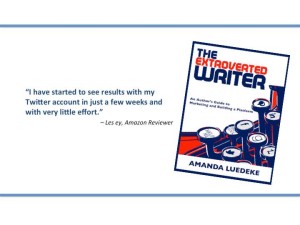Thursdays with Amanda: The Future of Publishing According to Me
 Amanda Luedeke is a literary agent with MacGregor Literary. Every Thursday, she posts about growing your author platform. You can follow her on Twitter @amandaluedeke or join her Facebook group to stay current with her wheelings and dealings as an agent. Her author marketing book, The Extroverted Writer, is available from Amazon and Barnes & Noble.
Amanda Luedeke is a literary agent with MacGregor Literary. Every Thursday, she posts about growing your author platform. You can follow her on Twitter @amandaluedeke or join her Facebook group to stay current with her wheelings and dealings as an agent. Her author marketing book, The Extroverted Writer, is available from Amazon and Barnes & Noble.
After spending the past number of weeks talking (and hailing) hybrid publishing (see posts here, here, here, and here), it begs a very important question…
What is the future of publishing?
As self-publishing continues to grow, as authors are offered more options to achieve their dreams, as traditional publishers continue to try and crack the e-publishing code, as start-ups focus primarily on e- and POD- publishing for their books, and as America’s reading habits evolve…where does that leave us?
Where does that leave the book? The bookstore? The library?
I’m no Predictor of the Future (well, okay, maybe I am a little), but I do have a few thoughts about where we’re headed…and I think it’s going to be an interesting ride.
- Eventually, it’s going to be fairly easy to get successful self-published books into bookstores. Someone, somewhere, with a ton of the right connections and enough money to give it a go is going to start a company that finds the best of the best in the self-publishing world and then presents those books to the buyers at B&N, Books-A-Million, Wal-Mart, etc. And because of this individual’s reputation and their product list of tried-and-true Amazon bestsellers, those stores are going to buy. And they’re going to shelve those books. This means that successful indie authors won’t ever have to partner with a publisher again to get their books into stores. They’ll just have to partner with an indie-friendly distributor. It‘s worth saying that there ARE venues that promise this kind of service, but I’ve never actually seen it come through in a way that gets massive distribution for top indie titles.
- Platform will become more important for new fiction authors. We’re at a point in which platform is essential for nonfiction authors to get published, but it’s not as much of a big deal for fiction authors. Publishers tend to check to see if the author has a website and a Facebook Page or Twitter Handle and that’s about it. They just want to be reassured that the author knows how to use such channels. They don’t actually expect large numbers associated with them. But as self-publishing grows and as it changes the industry, we’re going to see publishers expecting more of a platform from their fiction authors. This is because there will be other new fiction authors out there who have already developed a following. Authors who have self-pubbed some novellas and consequently have substantial RSS subscriptions or something of the sort. The gist here is that as more and more authors work hard to peddle their self-published careers, it’ll put the pressure on new novelists to also have something of a platform in place. Hence making way for the Hybrid Author. I’ve already begun to see this come into play…new novelists with platforms are being chosen over new novelists without platforms, and publishers are starting to say that without a following, they can’t justify bringing a debut novelist on board.
- The giant publishers will become pickier than ever, while start-ups, micro-publishers, and small houses will see profits grow. If you think the surge of successful indies and the number of authors going solo will get the gatekeepers to widen the gate, you’re mistaken. Those particular gates will narrow, making it tougher for authors to get in with the biggest houses. Which also means that as giant publishers require bigger platforms and more polished books, there will be smaller houses that rise up to serve authors who don’t want to self publish and who don’t have big platforms. The way these publishers split earnings with authors will continue to be different than what you’d get with a big house. 70/30, 60/40, and 50/50 royalty splits will become more and more normal among smaller houses, and if bookstores want to stay afloat, they will be buying from these smaller houses as well.
And probably the most exciting point…
4. Authors will get smarter than ever and find ways to work the system. We already see this in bundled boxed sets from indie authors and promotional campaigns that include a handful of Amazon bestselling authors…but I guarantee these strategies will only get more creative. Some could argue that sites like Kickstarter.com have more opportunity to offer authors than a traditional publisher (please note that if you go with Kickstarter to fund your book, it’s going to be a heck of a lot more work than publishing with a traditional publisher). Imagine if an Indie author wanted to do a hardcover launch of a new book…but not only that, she wanted to get the book into independent bookstores and embark on a coinciding US tour. Kickstarter makes this possible. The author can earn the funds (whether solo or with a group of authors) to give her fans what they want. She could even fund movies or webisodes or Comic-Con booths or national book launch parties. The sky is the limit…well, actually, the author’s energy level is the limit. This stuff is grueling and requires business savvy.
It’s a really neat option, and the best part is that this isn’t limited to indie authors. Traditionally published authors can also use sites like Kickstarter to fund promotional campaigns and other things that their publisher may not be focusing on.
So what does this mean? It means that every writer will have a chance at success. Every writer will have self-publishing, hybrid-publishing, Kickstarter options that they can use to make their careers happen.
Some will succeed. Some will fail.
But more than anything I predict the result of all this is that authors will once again be seen as superstars. They will be their brand–they will be the draw just as much as their books.
This is happening in the music industry as we speak…record labels aren’t in the business of churning out great music. They’re in the business of creating stars. The movie industry seems to also be seeing a sort of revolution as industry professionals strike out on their own to make their dreams come true (*cough* Zach Braff *cough*). These professionals are raising gobs of money just based on their clout and brand alone. They have fans who will fund them…regardless of whether or not the latest project is any good. The fans believe in the artist, and therefore they want his art.
Sometimes these individuals will partner with a big company. Sometimes not.
It doesn’t mean the big companies are any less important or valuable or successful. It just means the way we do business is changing. And the gatekeepers will continue to keep their gates and determine who gets in and who stays out of their very important clubs, but while this is happening, new gates are being constructed. And it’s an exciting time when an author gets to decide which gate is right for him.
I realize this may sound like a big fat hip-hurray for “sticking it to the man” and going independent, but we’re still in a state of flux. These predictions haven’t fully come to fruition yet, and to be honest, the best business model out there right now is the one of being a Hybrid. Either that, or hitting it HUGE on the indie scene OR on the traditional scene. Either of those work as well.
But for now, we’re learning. Things are shifting. And it’s a great time to be an author.
_____________
Like what I have to say? Check out my book on building a platform!



4 Comments
Great post. Is your new book geared more toward fiction, nonfiction or either?
Thanks
Jill
A great time to be an author—if you’re also good at marketing. I know from experience that I’m not, unfortunately. I can do it, but not well. I really hope I can find a good publicist when the time is right…
These predictions seem pretty logical. Thanks for sharing Miss Amanda.
Interesting predictions, Amanda. I hope you’re right about someone getting indie books into bookstores. I’d love to see that.